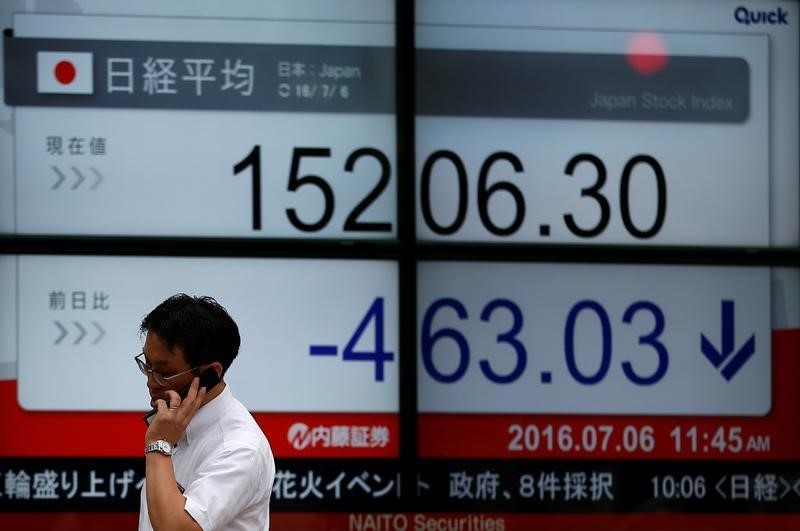This post was originally published on this site
https://i-invdn-com.investing.com/news/LYNXNPEC6601N_M.jpg
Fitch had earlier this week downgraded its rating for the U.S. government to AA+ from AAA, citing concerns over fiscal spending and increased clashes between the Democrats and Republicans.
While analysts downplayed the direct impact of the downgrade, the move still triggered a wave of selling across global stock markets, as investors locked-in profits after a strong run through June and July.
Tech stocks, which had seen strong gains over the past two months, bore the brunt of selling pressure, with South Korea’s KOSPI and Hong Kong’s Hang Seng index falling 0.8% and 0.6%, respectively.
Stocks were also rattled by stronger-than-expected U.S. private payrolls data on Wednesday, which boosted the dollar and Treasury yields as markets positioned for a similar reading from official nonfarm payrolls data due on Friday.
Resilience in the U.S. economy- particularly in the labor market- gives the Federal Reserve more headroom to keep raising interest rates, which bodes poorly for risk-driven stock markets.
Tech stock holders were also on edge ahead of earnings reports from Apple Inc (NASDAQ:AAPL) and Amazon.com Inc (NASDAQ:AMZN).
Broader Asian markets retreated. Japanese stocks were among the worst performers for the day, with the Nikkei 225 index sliding 1.6%, while the broader TOPIX fell 1.2%. Local stocks were hit by a mix of profit taking, as well as uncertainty over the Bank of Japan’s stance on its ultra-dovish monetary policy.
Australia’s ASX 200 fell 0.5% as data showed that the country’s trade surplus remained steady in June. Australian retail sales also fell less than expected in the second quarter.
Futures for India’s Nifty 50 index pointed to a slightly positive open, after the index plummeted from record highs this week. High weightage of technology stocks weighed heavily on the Nifty and the BSE Sensex 30 in recent sessions.
China’s Shanghai Shenzhen CSI 300 and Shanghai Composite indexes fell less than their peers on Thursday, as a private survey showed that the country’s services sector grew more than expected in July.
The reading indicated that steady retail spending and services demand was still keeping some facets of Chinese business activity afloat, and could help support a bigger economic recovery this year, especially if the government rolls out more stimulus measures.
But investors appear to have somewhat soured on the prospect of more Chinese stimulus, given that officials have offered up few details on how the measures will be carried out. The country’s biggest economic engines- manufacturing and real estate- are also struggling despite promises of more support.

